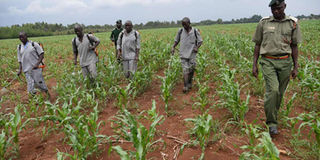No insurance cover for fall armyworms, pesticides to help

Darius Too, the farm manager at Ngeria Farm Prisons in Uasin Gishu County supervises as inmates spray their maize crops against fall armyworms. PHOTO | JARED NYATAYA | NMG
What you need to know:
- An adult moth can lay up to 2,000 eggs, which makes it very invasive and destructive. Although the Ministry of Agriculture has no reliable data on the extent of the infestation yet, the US Agency for International Development (USAid) estimates that up to 50 per cent of the maize crop could be destroyed.
- As the pest strikes for the second consecutive year, farmers have no recourse in terms of insurance cover in case their crops are devastated, as they would be.
- Timothy Munyoki, a senior agronomist at Amiran-Kenya, says that warmer areas provide favourable temperature for the survival of the moths.
- The pest can also pupates in the soil as it awaits crops to be planted then attacks as soon as they sprout
For Darias Too, curbing the notorious fall armyworm would have been his biggest relief. Sadly, his frustrations are far from over as the crop munching caterpillar resurfaced this season.
The farm manager at Ngeria Prison Farm in Eldoret noticed symptoms of the pest attack on the 600-acre farm two weeks ago, which quickly prompted him to reach out to a nearest agro-dealer for assistance.
He was given some pesticides that the dealer said must be sprayed in the evenings because the caterpillars are nocturnal.
However, every morning when Too returns to the farm to inspect the progress of the spray, he is shocked to find the caterpillars tucked inside the plants’ piths, alive and munching.
“We supply nearly all prisons with maize across the country every year. You can imagine the devastation we will have if the caterpillars won’t be controlled,” Too remarks.
Too now believes that the pests have developed some level of resistances to the pesticide he uses, which enables them to survive every round of spray, or he is not using the correct chemical. More worse, the chemical might be fake.
An adult moth can lay up to 2,000 eggs, which makes it very invasive and destructive. Although the Ministry of Agriculture has no reliable data on the extent of the infestation yet, the US Agency for International Development (USAid) estimates that up to 50 per cent of the maize crop could be destroyed.
“We have spent Sh9.6 million in terms of inputs and machinery. Averagely, we harvest over 12,000 90kg bags of maize, which translates to Sh50 million, but we are now not sure of the harvest this season,” Too laments, adding that their farm supplies grains to all the prisons across the country.
As the pest strikes for the second consecutive year, farmers have no recourse in terms of insurance cover in case their crops are devastated, as they would be.
Joel Rogony, a member of Uasin Gishu County Assembly and a farmer, who grows maize on 200 acres in Kipsombe village, says despite insuring his farm, he lives in constant fear worried about the moth. This is because his insurance only covers the farm against weather perils.
Insurers say they do not provide covers against the moth because it is predictable.
RETURN ATTACK
Jackie Tonui of APA Insurance confirmed that insurance companies across the country do not have policies covering fall army worms under our crop insurance.
“There is no cover in the country which covers against fall armyworms as it not an unforeseen risk. Farmers are advised to get information on the management of these pests from government agricultural offices and use the correct pesticided,” she noted, adding that unforeseen risk means a situation that could not be predicted or was not expected.

Grace Nyambeki in her farm in Kangundo where the effects of fall armyworm invasion have also taken a toll on the farm's maize production. FILE PHOTO | NMG
Rahab Kariuki, ACRE Africa managing director, says that in other countries such as Zimbabwe, South Africa, Uganda, Ghana and others, insurers and reinsurers have established that the pest is controllable, therefore, cannot be insured.
Ms Kariuki says that in the event of a fall army worm outbreak, “This is classified as a catastrophe which insurance companies say they don’t have the financial capacity to reserve. The most effective way to handle cases like this, is for the government to act as the insurer of last resort.”
She says that but the pest can be controlled by identifying the conditions they thrives in, effective scouting, burning stalks from a previous harvest and spraying regime among others, this then disqualifies the peril from the definition of uncontrollable pest and disease under which the pest would have been insured, “Ms Kariuki says.
“Insurers agree that the pest is new to farmers which means farmers need training on how to identify and manage it.
Additionally, if a farmer was affected the previous season, there is a high likelihood of a return attack. Which makes the peril foreseeable and therefore not insurable,” she noted adding that by definition, in insurance terms, a peril is insurable if it is uncertain and accidental.
Timothy Munyoki, a senior agronomist at Amiran-Kenya, says that warmer areas provide favourable temperature for the survival of the moths.
“The pest can also pupates in the soil as it awaits crops to be planted then attacks as soon as they sprout,” he said adding that early detection through scouting is crucial.
“There are several products for controlling the pest, but they mutate very fast so we recommend four different chemicals of different classes. Once a farmers prays one chemical today, he should spray a different one the next day,” he advised, adding that spraying should be done in the evening for better efficacy because the nocturnal.





